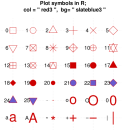# Title: Demonstration of all of the possible PCH character selections
# Date: 2008-02-01
# Project: CFL R graphics
rm(list = ls()) # clear objects
graphics.off() # close graphics windows
# --------------------------------------------------------------------------
# Create function ('pchShow') which displays the graphics symbols in R
# Borrowed heavily from the example in help("points")
# FUNCTION ARGUMENTS
# ----------------------
# "extras": character symbols to plot (in addition to pch values 0:25)
# "symbolsize": symbol size (magnification relative to default size);
# see help(par) / "cex" ; help(points) / "cex"
# "symbolcolor": symbol color (only color for symbols 0:21, and chars;
# edge color for pch 21-25.
# see help(par) / "col"; or help(points) / "col"
# also help(colors)
# "fillcolor": the fill color for symbols 21-25; Also called "background" color
# ignored for all other symbols and characters
# see help(points) / "bg"
# "linewidth": the width/weight of the lines used in plotting the symbols.
# relative to the default value of 1.
# see help(points) / "lwd" ; or help(par) / "lwd"
# "textcolor": the color of the text which accompanies & identifies the symbols
# "textsize": text size for the accompanying text on the plot.
# relative to default value of 1. Use "0" for no labels.
# "main": the title of the plot
pchShow <-
function(extras = c(".", "o", "O", "0","a","A", "*", "+","-","|"),
symbolsize = 3, #
symbolcolor = "red3",
fillcolor = "slateblue3",
linewidth = 1,
textcolor = "black",
textsize = 1.2,
main = paste("Plot symbols in R;\n col = \"",
symbolcolor, "\", bg= \"",fillcolor,"\"" )
)
{
# Organize symbols & characters to be plotted
# --------------------------------------------------------------------------
nex <- length(extras) # number of char graphics symbols to plot
n_points <- 26 + nex # total number of symbols to plot
ipch <- 0:(n_points-1) # sequence of pch id numbers (0,1,2,...25)
# create list of pch values (0:25); ('list' allows integers & strings)
pchlist <- as.list(ipch)
# Add the special characters to the list (if any)
if(nex > 0) pchlist[26 + 1:nex] <- as.list(extras)
# Set up graphing space for display of symbols
# --------------------------------------------------------------------------
# no. of columns to display in graph
# (selected such that plot is close to square, nrows ~= ncols)
k <- floor(sqrt(n_points))
dd <- c(-1,1)/2 # padding of graph (+ 0.5 units on each side)
# x coordinates for plotting symbols ('a %% b' means 'a modulus b';
# that is, divides a by b and returns the remainder.)
ix <- ipch %% k
# y coordinates for plotting symbols ('a %/% b' indicates integer division,
# that is, it returns the integer portion of the quotient only)
iy <- 3 + (k-1)- ipch %/% k
rx <- dd + range(ix) # full range of x axis
ry <- dd + range(iy) # full range of y axis
# create plot window
plot(rx, ry, type="n", axes = FALSE, xlab = "", ylab = "", main = main)
# display grid lines
abline(v = ix, h = iy, col = "lightgray", lty = "dotted")
# Plot symbols and symbol labels (loops through each symbol type)
# --------------------------------------------------------------------------
for(i in 1:n_points) {
# for each value, i, get symbol id from list created ealier
pch_i <- pchlist[[i]]
# plot point at x(i), y(i), using the selected symbol.
# Colors and size determined above
# 'bg'-colored interior (only available for pch 21-25) :
points(ix[i], iy[i], pch = pch_i, col = symbolcolor, bg = fillcolor,
cex = symbolsize, lwd=linewidth)
if(textsize > 0)
text(ix[i] - .3, iy[i], pch_i, col = textcolor, cex = textsize)
}
}
pchShow()
#pchShow(c("a","A","b","B"), symbolsize = 2.5)
#pchShow({}, symbolsize = 4, linewidth=3)
#pchShow(c("a","A","b","B","c", "C", "1", "2", "3", "4"), symbolsize = 2.5)

Graphics
A project from the Center for Limnology - UW Madison
This site should be viewed with Firefox
 or Safari
or Safari


